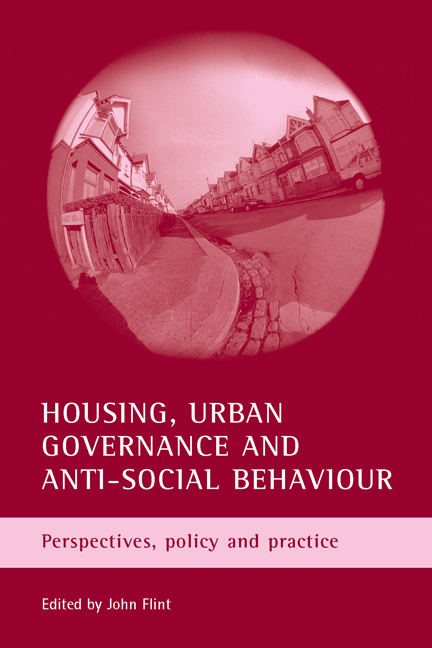Book contents
- Frontmatter
- Contents
- List of tables, figures and photographs
- Acknowledgements
- Notes on contributors
- Introduction
- Part 1 The definition and construction of anti-social behaviour in the UK
- Part 2 Legal techniques and measures utilised by social landlords to address anti-social behaviour
- Part 3 The emerging mechanisms of addressing anti-social behaviour in housing governance
- Part 4 Studies of housing and anti-social behaviour from an international perspective
- Index
eleven - Policing and community safety in residential areas: the mixed economy of visible patrols
Published online by Cambridge University Press: 15 January 2022
- Frontmatter
- Contents
- List of tables, figures and photographs
- Acknowledgements
- Notes on contributors
- Introduction
- Part 1 The definition and construction of anti-social behaviour in the UK
- Part 2 Legal techniques and measures utilised by social landlords to address anti-social behaviour
- Part 3 The emerging mechanisms of addressing anti-social behaviour in housing governance
- Part 4 Studies of housing and anti-social behaviour from an international perspective
- Index
Summary
Introduction
A recurring theme of this book is that the control of tenants’ conduct and the policing of social behaviour have been ever-present features of social landlordism from the late Victorian era onwards. Since the 1990s, however, there has been a renewed preoccupation in social housing management with responding to tenants’ anxieties about crime and victimisation and with governing anti-social behaviour (ASB). In England and Wales, social landlords have been drawn into local partnerships focused around crime prevention and community safety and have been encouraged to assume greater responsibility for ensuring safe and secure environments for their tenants. In support of this enhanced role, social landlords now have recourse to a greater variety of legal instruments of control (see Chapters Six, Seven and Eight, this volume). Social landlords have also been enlisted into participating in an array of initiatives concerned variously with improving the quality of the built environment, joining up local services, neighbourhood liveability and sustainability, civic renewal and community governance, all of which are linked, either implicitly or explicitly, with issues of crime and disorder.
There is a growing connection made in urban and housing policy between community safety and urban renewal, with security forming the bedrock on which community life flourishes and without which communities will tip into spirals of decline and decay (ODPM, 2005). The provision of reassurance and security are regarded as prerequisites for attracting people and capital to move to, invest in, or remain in, certain urban locations. This is particularly salient with regard to unpopular social housing estates where crime and disadvantage have become concentrated.
Governing through crime has become a major component of modern social housing, with an intensification of the reach and depth of social landlords’ role in policing ASB. One manifestation of this has been social landlords’ involvement in the provision of forms of contracted additional patrol services dedicated to specific residential areas. It has become acceptable, and to some degree expected, for social landlords to take control of their own policing and security needs, to select the providers of security and provide or access funding to pay for it.
- Type
- Chapter
- Information
- Housing, Urban Governance and Anti-Social BehaviourPerspectives, Policy and Practice, pp. 219 - 238Publisher: Bristol University PressPrint publication year: 2006



